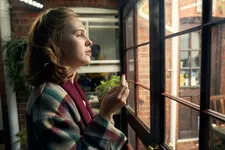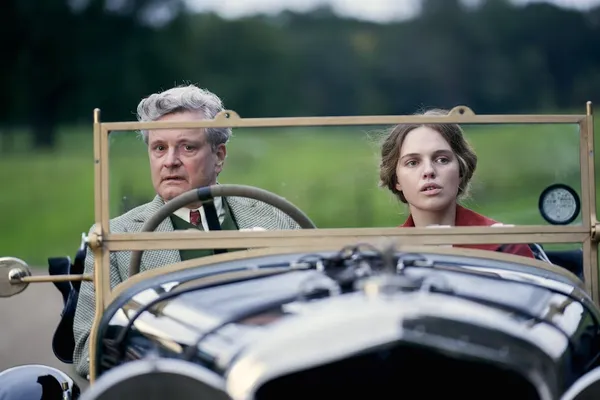 |
| Jane Fairchild (Odessa Young) with Godfrey Niven (Colin Firth) in Eva Husson’s Mothering Sunday |
Eva Husson’s prepossessing Mothering Sunday, based on the 2016 novel by Graham Swift, with a screenplay by Alice Birch, produced by Elizabeth Karlsen and Stephen Woolley (Number 9 Films - Todd Haynes’s Carol, based on Patricia Highsmith’s novel The Price Of Salt), stars Odessa Young with Josh O’Connor (Prince Charles in The Crown), Colin Firth, Olivia Colman (Oscar-nominated for Maggie Gyllenhaal’s The Lost Daughter, based on Elena Ferrante’s novel and Oscar-winner for Yorgos Lanthimos’s The Favourite), Patsy Ferran, Sope Dirisu, Emma D’Arcy, and Glenda Jackson.
 |
| Eva Husson with Odessa Young and Anne-Katrin Titze on the Bloomsbury Group inspiring the costumes: “Virginia Woolf and her friends, because I was obsessed with them.” |
Costumes by the great Sandy Powell, production design by Helen Scott (Steve McQueen’s Small Axe series, Mangrove; Lovers Rock; Red, White And Blue; Alex Wheatle; Education), editing by Emilie Orsini (Husson’s Girls Of The Sun, Bang Gang: A Modern Love Story), and the cinematography of Jamie Ramsay make the film a pleasure for the eyes, while pushing us to think deeper of what is actually shown on screen.
Much of the action takes place on one balmy Sunday in March of 1924. Orphaned Jane Fairchild (Odessa Young) works as a maid at the sprawling English country estate owned by the Nivens (played by Firth and Coleman). A picnic is planned, which doubles as a celebration of an engagement.
The Nivens meet their friends, the Sheringhams (Emily Woof and Craig Crosbie), whose son Paul (Josh O’Connor) is to marry Emma (Emma D'Arcy), daughter of Giles and Sylvia Hobday (Simon Shepherd and Caroline Harke). Jane and the other maid, Milly (Patsy Ferran) get the day off. The two girls set out on their bicycles, hair blowing in the wind, and while Milly visits her mother, Jane meets her lover, who is none other than Paul.
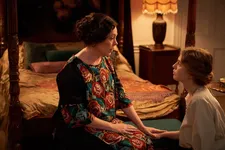 |
| Clarrie Niven (Olivia Colman) with Jane Fairchild (Odessa Young) Photo: Robert Viglasky, courtesy of Sony Pictures Classics |
We encounter Jane later in life during numerous flash forwards. In the late 1940s she has become a writer, whose relationship with Donald (Sopé Dìrísù), an Oxford educated Black man, brings back memories of what made her write in the first place.
In the 1980s - Jane is now played by Glenda Jackson wearing the same ring - the highest professional merits still cannot compete with the self discoveries made so long ago, when the First World War and the unfathomable losses were still fresh.
A central instant brings to mind Marcel Duchamp’s Nude Descending a Staircase. It is a study of time and slices newly found identity. Alone in the Sheringham’s lavish house after Paul leaves, Jane goes on a tour of discovery. When she touches her rich lover’s shirts, we encroach on The Great Gatsby territory, but unlike Daisy, her Fitzgerald counterpart, Jane isn’t entranced by the silks and satins. Odessa Young in this difficult scene displays the self-confidence of an emperor who with open eyes sees through the ruse and embraces the fact that there aren’t any clothes.
From New York City, Eva Husson and Odessa Young joined me on Zoom for an in-depth conversation on Mothering Sunday.
Anne-Katrin Titze: Odessa, nice to meet you! Eva, we met twice before, at Rendez-Vous with French Cinema [in 2016] for Bang Gang: A Modern Love Story and then [at Cohen Media Group] for Girls of the Sun in 2019. It’s lovely to see you again!
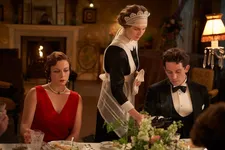 |
| Emma Hobday (Emma D’Arcy), Jane Fairchild (Odessa Young), and Paul Sheringham (Josh O’Connor) Photo: Jamie D Ramsay (SASC), courtesy of Sony Pictures Classics |
Eva Husson: Thank you so much! Lovely to see you for a third time!
AKT: In your previous film, war was very present. In this film as well, war looms large, although it is in the characters’ past. Can you talk a bit about that connection? Did one move you into the other?
EH: It’s funny, I actually have to admit I never thought of it. It was sort of subconscious, I guess. It’s also testament to the fact that throughout the history of humanity war has been more of a common factor than peaceful time. Case in point Ukraine at the moment.
Maybe it’s some subconscious worry that I had, you know, about entering war times. They’re such great windows into society and how we function when we’re put in moments of distress. I think it just heightens the stakes and that’s why there are interesting narrative moments to develop.
AKT: It’s Mothering Sunday and a lot of it takes place in one day and then there’s a big time switch to Glenda Jackson as well. Odessa, did you go and watch all Glenda Jackson movies when you knew you were going to be doubled up [in one character] with her?
Odessa Young: If I’m being completely honest, I have not seen a Glenda Jackson movie in the full. I have seen clips of Glenda Jackson act. I predominantly knew and respected her primarily for the politics aspect of her career. Because I’ve often struggled with the idea of how limited the scope of our work can be sometimes.
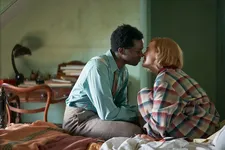 |
| Donald (Sopé Dìrísù) with Jane (Odessa Young) Photo: Robert Viglasky, courtesy of Sony Pictures Classics |
I do believe that media can change the world, I do believe that films can change the world. I think it takes a lot longer. It’s very fitting for the movie, right? She pushed herself further beyond what people of her career have done before. I got to sit out on the back of this house with her for a day and just pick her brain. Acting is acting, but she’s a special woman and a phenomenal actress.
AKT: Colin Firth early on says “Gorgeous day, gorgeous day!” It turns out it is and it isn’t. There’s a lot going on and I do want to talk about how gorgeous the film is as well. The production design is fantastic [the flowers!] and so are the costumes by Sandy Powell. Tell me about the collaboration with Sandy Powell, Eva. And then Odessa, how did the costumes help you to get into the role?
EH: You know, one of the things with Sandy, it was a very tough moment. Technically we were the sixth production taking costumes out of the costumer houses from the 1920s. So we were left with barely anything. And I think a more junior costume designer would have freaked out and gotten so worried that the end result was going to be disappointing.
At some point I was able to let that go and be like, Sandy, she’s going to make a miracle, she’s just going to do it. And she did exactly that. In the background, extras at moments their clothes had holes in them, but it worked just with what we had and for the main actors - you know, she spent decades buying fabric from the Twenties and Thirties and we cut stuff in that fabric. I kept on giving her references from the Bloomsbury Group.
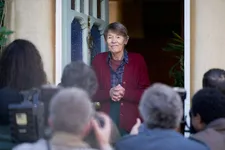 |
| Glenda Jackson as Jane Fairchild Photo: Robert Viglasky, courtesy of Sony Pictures Classics |
AKT: That’s interesting!
EH: Virginia Woolf and her friends, because I was obsessed with them. You know, Olivia Coleman is basically dressed after Virginia Woolf, which is something that I had a lot of fun coming up with. That was really cool. So it was between my own fancies, Sandy’s incredible talent, and the resources we had which were very meagre, but we made it work. You just dress the actors and voilà!
AKT: Voilà! Odessa, a word about the costumes! Did what you’re wearing change you?
OY: Oh yeah. Sandy’s gift is that she is so dedicated to the function of costume, not just the look of them, specifically how it sits on your body, how it changes the way that you move, which is very specific to the time period. My costume from the 1910s and 20s felt extremely different on me than my costume from the 1940s, and even between Jane as a maid and Jane as getting a job and leaving the house in the 20s.
The costumes I had that weren’t from the maid days were exceptionally freeing and more and more freeing as the time went by, which is a very deliberate and distinct choice. Sandy isn’t afraid to let a costume wrinkle and move and change with the scene, change with the weather. Actors are used to being frequently chased around set with a brush and a lint roller and touched all the time.
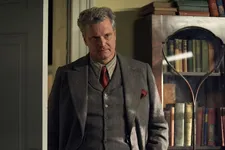 |
| Eva Husson on Colin Firth as Godfrey Niven: “When I have to make an adjustment, he goes for it.” Photo: Jamie D Ramsay (SASC), courtesy of Sony Pictures Classics |
Sandy kind of lets it all happen naturally, which is again very freeing but also on the screen creates incredible depth of reality. It’s really really grounding. She hand-dyes her own fabrics because those colours are very specific and important to her. And she knows she’ll never find the right colour or texture unless she makes it herself. She’s so incredibly committed to this job.
AKT: What you say about the movement, I am thinking of the scene on the bicycle. Which actually reminded me of the skateboard moment in Bang Gang.
EH: Of course, there are definitely parallels between the kinetic visuals that I have of youth. And I really wanted to film Jane as a young person. She is very modern; her relationship to her body, her relationship to love and freedom is extremely contemporary. Bang Gang was a modern love story and Mothering Sunday is a modern love story.
AKT: A century can go by but something about youth remains the same. There are things that have not completely changed. We talked about the costumes, now there’s also the opposite, the Nude Descending a Staircase. The Marcel Duchamp moment when you are walking through the manor, exploring it. It also felt a bit like a Gatsby moment, especially when looking at the shirts - a fascination with that house. Tell me about that exploration of the house! These are powerful scenes, Odessa.
OY: Thank you!
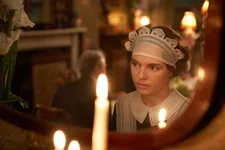 |
| Odessa Young on Jane Fairchild: “My costume from the 1910s and 20s felt extremely different on me than my costume from the 1940s …” Photo: Robert Viglasky, courtesy of Sony Pictures Classics |
EH: I didn’t think about The Great Gatsby. For me it was very powerful and singular in the sense that I’ve never seen - and it’s a very simple image - but I’ve never seen the image of a woman walking naked in a house where she’s not supposed to walk naked because she’s a woman and she’s from a lower social class. I think the political stance that it brings and the simplicity of it, it’s just her presence is political. That’s what I was fascinated by. That’s why my terror was to film it in a sensual way, because I didn’t want that. It was not about that.
We had funny moments, like, if we see the boobs on the stairs all the time, we’re just going to look at the boobs and not at the actual action, which is just her being there. All these little things where you have to be very specific and not get carried away with how pretty an image can be in moments like this, but always go back to why it’s such an important image. That was a lot of fun to conceive and kind of excruciating to film. At the beginning we were all like “Ah, she’s walking! Ah, she’s walking. She’s still walking!” How do we make it interesting? She’s walking some more. It was a little bit of a challenge.
AKT: It works, the transgressive idea in the simplicity. Was it “fun” to walk, Odessa? Or not so much?
OY: No, it was really boring.
EH laughs a hearty laugh: Ooh, I’m intrigued!
OY: I’m just kidding. I love every day of my job. It’s actually just a real challenge to have no dialogue or real plot-driving action. Obviously it can be argued that this is plot-driving action, even if it’s so nuanced. But I’m not like punching out bad guys, I’m walking through a house for an hour.
It is a challenge and similarly to what Eva was saying about editing, because playing the footage back you see walking, walking, some more walking, touching, looking. That’s what it felt like to shoot, like Monday, Tuesday, Wednesday, Thursday was just filled with me putting my bare feet on stone and touching books. That was pretty phenomenal, not in a good way, just phenomenal.
EH: I love how memory works, Odessa. Because literally I think it was actually two or three hours of the day.
OY: Absolutely not! I was naked for a week!
EH: The dialogue scene in the bedroom was most of that time, not the walking!
OY: Whatever, memories, memories. To go back to your initial question about the opposite of costume. I actually work completely differently. The nudity in and of itself is still a costume in the movie. It’s a costume that she actually gets to put on for the first time in her life. She’s never seen her naked body before. She’s lived her entire life with a mirror that’s that big [Odessa puts her two thumbs and index fingers together] in her bedroom. This is a costume for her, it does mean something else to her than just a naked vulnerable state.
 |
| Maids at the train station in Mothering Sunday Photo: Jamie D Ramsay (SASC), courtesy of Sony Pictures Classics |
Similar to how Sandy’s costumes affected my movements, that costume affected my movement as well because it was never like Jane was unaware of her body. She wasn’t just walking through this space as an amoeba, she was actually taking everything in and it meant something. It was also, apparently hours, I think it was days, shooting that state. Which is a bit like a sensory deprivation chamber sometimes when actually you’re so limited to just walking, you start to freak out a little bit. I was really happy to have full beginning-middle-end scenes again to shoot after.
AKT: In a way the opposite of your scene walking through the house is the performance of Colin Firth. He is so much a type of man from the 20th century who doesn’t allow anything to come close to him. Others have moments of opening up, for him it’s a fantastic closing off, as in: Don’t make me talk about all that is going on. The pot is so close to boiling over. Can you talk a bit about that performance and the work with Colin, Eva?
EH: Colin’s an amazing actor. We sort of let him have fun. He’s just very generous and an amazing listener. So we talked a lot. He’s very generous in the sense that he offers a lot of options and he takes directions really well, surprise, surprise. So when I have to make an adjustment, he goes for it. If he gets stuck on something, he reaches out to you and he leans on you. Literally, I don’t think I can say one bad thing about Colin Firth.
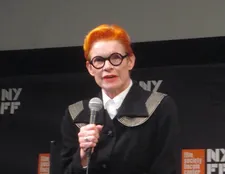 |
| Odessa Young on Sandy Powell: “She hand-dyes her own fabrics because those colours are very specific and important to her.” Photo: Anne-Katrin Titze |
AKT: I don’t expect you to!
EH: It’s funny, because I’m just fueling the fire of the icon, you know.
AKT: There’s a line Olivia Coleman’s character says: “Comprehensively bereaved at birth.” It’s so pivotal.
OY: I think that that’s the line that Jane cycles through in her head for the rest of her life. I think that is the reason for her to do anything that she does. And I think that Olivia, that Mrs. Niven, gives her a gift that day. It’s kind of the biggest service that has been done to Jane the entire movie and her entire life of service. It’s a line that’s hard to understand. It’s a line that has, I believe, many ambiguous meanings. Ultimately I think it means that Jane’s experience of loss will always be unique.
AKT: Thank you so much. It’s a beautiful film.
EH & OY: Thank you!
AKT: See you for your next film!
Sony Pictures Classics theatrical release of Mothering Sunday in the US is on Friday, March 25.








